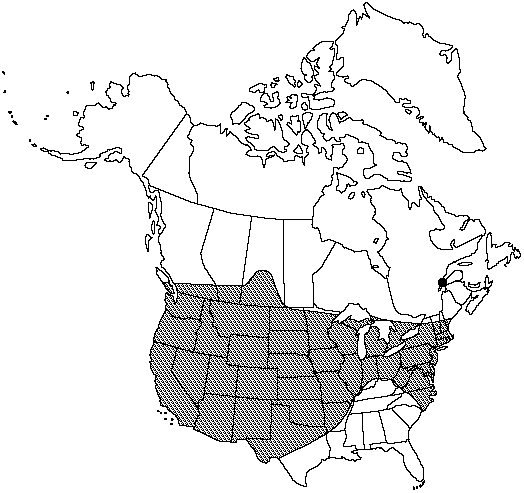Difference between revisions of "Equisetum ×ferrissii"
Fern Bull. 12: 22. 1904.
FNA>Volume Importer |
imported>Volume Importer |
||
| (7 intermediate revisions by 2 users not shown) | |||
| Line 11: | Line 11: | ||
|name=Equisetum hyemale var. elatum | |name=Equisetum hyemale var. elatum | ||
|authority=(Engelmann) C.V. Morton | |authority=(Engelmann) C.V. Morton | ||
| − | }}{{Treatment/ID/Synonym | + | |rank=variety |
| + | }} {{Treatment/ID/Synonym | ||
|name=Equisetum hyemale var. intermedium | |name=Equisetum hyemale var. intermedium | ||
|authority=A.A. Eaton | |authority=A.A. Eaton | ||
| + | |rank=variety | ||
}} | }} | ||
|hierarchy=Equisetaceae;Equisetum;Equisetum subg. Equisetum;Equisetum ×ferrissii | |hierarchy=Equisetaceae;Equisetum;Equisetum subg. Equisetum;Equisetum ×ferrissii | ||
| Line 22: | Line 24: | ||
}}<!-- | }}<!-- | ||
| − | --><span class="statement" id="st- | + | --><span class="statement" id="st-undefined" data-properties=""><b>Aerial </b>stems having basal part persisting over winter, unbranched, 20–180 cm; lines of stomates single; ridges 14–32. <b>Sheaths</b> elongate, 7–17 × 3–12 mm, becoming dark-girdled with age; teeth 14–32, articulate and promptly shed or persistent. <b>Cone</b> apex pointed; spores white, misshapen.</span><!-- |
-->{{Treatment/Body | -->{{Treatment/Body | ||
| + | |phenology=Cones maturing in late spring–early summer but spores not shed. | ||
|habitat=Moist lakeshores, riverbanks, roadsides, prairies | |habitat=Moist lakeshores, riverbanks, roadsides, prairies | ||
|elevation=0–2500 m | |elevation=0–2500 m | ||
|distribution=Alta.;B.C.;Ont.;Que.;Sask.;Ariz.;Ark.;Calif.;Colo.;Conn.;Del.;D.C.;Idaho;Ill.;Ind.;Iowa;Kans.;Maine;Md.;Mass.;Mich.;Minn.;Mo.;Mont.;Nebr.;Nev.;N.H.;N.J.;N.Mex.;N.Y.;N.C.;N.Dak.;Ohio;Okla.;Oreg.;Pa.;R.I.;S.Dak.;Tex.;Utah;Vt.;Va.;Wash.;W.Va.;Wis.;Wyo.;n Mexico including Baja California. | |distribution=Alta.;B.C.;Ont.;Que.;Sask.;Ariz.;Ark.;Calif.;Colo.;Conn.;Del.;D.C.;Idaho;Ill.;Ind.;Iowa;Kans.;Maine;Md.;Mass.;Mich.;Minn.;Mo.;Mont.;Nebr.;Nev.;N.H.;N.J.;N.Mex.;N.Y.;N.C.;N.Dak.;Ohio;Okla.;Oreg.;Pa.;R.I.;S.Dak.;Tex.;Utah;Vt.;Va.;Wash.;W.Va.;Wis.;Wyo.;n Mexico including Baja California. | ||
| − | |discussion=<p>The hybrid between Equisetum hyemale and E. laevigatum, E. × ferrissii, was mistaken for E. laevigatum by Schaffner and some subsequent authors. Although sterile, it exists outside the range of E. laevigatum, and apparently it is dispersed vegetatively (R.L. Hauke 1963). Perhaps it has persisted in some areas from a time when the parents were both there. Equisetum × ferrissii has been reported from Maine, New Hampshire, Rhode Island, South Dakota, and Vermont, but I have not seen specimens from those states.</p> | + | |discussion=<p>The hybrid between <i>Equisetum hyemale</i> and <i>E. laevigatum</i>, <i>E.</i> × <i>ferrissii</i>, was mistaken for <i>E. laevigatum</i> by Schaffner and some subsequent authors. Although sterile, it exists outside the range of <i>E. laevigatum</i>, and apparently it is dispersed vegetatively (R.L. Hauke 1963). Perhaps it has persisted in some areas from a time when the parents were both there. <i>Equisetum</i> × <i>ferrissii</i> has been reported from Maine, New Hampshire, Rhode Island, South Dakota, and Vermont, but I have not seen specimens from those states.</p> |
|tables= | |tables= | ||
|references= | |references= | ||
| Line 37: | Line 40: | ||
-->{{#Taxon: | -->{{#Taxon: | ||
name=Equisetum ×ferrissii | name=Equisetum ×ferrissii | ||
| − | |||
|authority=Clute | |authority=Clute | ||
|rank=species | |rank=species | ||
| Line 44: | Line 46: | ||
|basionyms= | |basionyms= | ||
|family=Equisetaceae | |family=Equisetaceae | ||
| + | |phenology=Cones maturing in late spring–early summer but spores not shed. | ||
|habitat=Moist lakeshores, riverbanks, roadsides, prairies | |habitat=Moist lakeshores, riverbanks, roadsides, prairies | ||
|elevation=0–2500 m | |elevation=0–2500 m | ||
| Line 51: | Line 54: | ||
|publication year=1904 | |publication year=1904 | ||
|special status= | |special status= | ||
| − | |source xml=https:// | + | |source xml=https://bitbucket.org/aafc-mbb/fna-data-curation/src/2e0870ddd59836b60bcf96646a41e87ea5a5943a/coarse_grained_fna_xml/V2/V2_391.xml |
|genus=Equisetum | |genus=Equisetum | ||
|subgenus=Equisetum subg. Equisetum | |subgenus=Equisetum subg. Equisetum | ||
|species=Equisetum ×ferrissii | |species=Equisetum ×ferrissii | ||
| − | |||
| − | |||
| − | |||
| − | |||
| − | |||
| − | |||
| − | |||
| − | |||
| − | |||
| − | |||
| − | |||
| − | |||
| − | |||
| − | |||
| − | |||
}}<!-- | }}<!-- | ||
-->[[Category:Treatment]][[Category:Equisetum subg. Equisetum]] | -->[[Category:Treatment]][[Category:Equisetum subg. Equisetum]] | ||
Latest revision as of 21:23, 5 November 2020
Aerial stems having basal part persisting over winter, unbranched, 20–180 cm; lines of stomates single; ridges 14–32. Sheaths elongate, 7–17 × 3–12 mm, becoming dark-girdled with age; teeth 14–32, articulate and promptly shed or persistent. Cone apex pointed; spores white, misshapen.
Phenology: Cones maturing in late spring–early summer but spores not shed.
Habitat: Moist lakeshores, riverbanks, roadsides, prairies
Elevation: 0–2500 m
Distribution

Alta., B.C., Ont., Que., Sask., Ariz., Ark., Calif., Colo., Conn., Del., D.C., Idaho, Ill., Ind., Iowa, Kans., Maine, Md., Mass., Mich., Minn., Mo., Mont., Nebr., Nev., N.H., N.J., N.Mex., N.Y., N.C., N.Dak., Ohio, Okla., Oreg., Pa., R.I., S.Dak., Tex., Utah, Vt., Va., Wash., W.Va., Wis., Wyo., n Mexico including Baja California.
Discussion
The hybrid between Equisetum hyemale and E. laevigatum, E. × ferrissii, was mistaken for E. laevigatum by Schaffner and some subsequent authors. Although sterile, it exists outside the range of E. laevigatum, and apparently it is dispersed vegetatively (R.L. Hauke 1963). Perhaps it has persisted in some areas from a time when the parents were both there. Equisetum × ferrissii has been reported from Maine, New Hampshire, Rhode Island, South Dakota, and Vermont, but I have not seen specimens from those states.
Selected References
None.